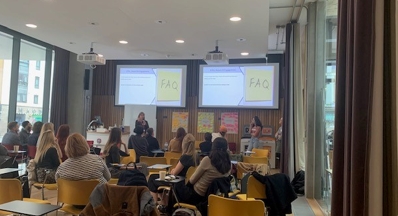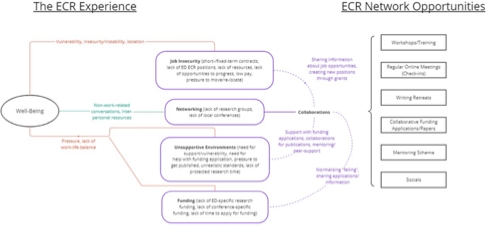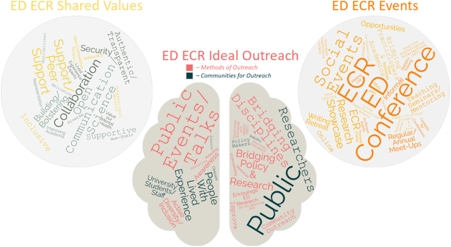The ED ECR Network: An Overview
08/02/24

As part of the Eating Disorders and Autism Collaborative (EDAC), we have also participated in the development and hosting of a national eating disorder (ED) early career researcher (ECR) Network. This network has been planned and developed by existing ECRs at EDAC (Dr Emy Nimbley and Dr Michelle Sader), as well as within the Eating Disorders: Delineating illness and recovery trajectories to inform personalised prevention and early intervention in young people (EDIFY) project (Dr Tine Opitz). The aims of this network involve:
- Providing opportunities for ECRs in the ED research field to collaborate and network with one another
- Identifying continuing professional development (CPD) opportunities to bolster essential skills and support the career development of ED ECRs
- Developing aims, priorities and strategies involved with establishing a UK-wide ED ECR network
- Planning future grant or fellowship applications to enhance ECR Network activities
An In-Depth Look at our One-Day ED ECR Network Development Workshop
EDAC has recently provided bursary funding for 12 UK-based ECRs to attend a one-day development workshop for the ED ECR network, which occurred on September 22, 2023. ED ECRs from all over the UK had the opportunity to connect, network, and take part in multiple activities and discussions that served to shape the ideals of our ED ECR Network.
Activities occurring during our one-day development workshop concerned discussing the experience of being an ECR within the ED field. This included delving into the challenges and expectations associated with early-career research in EDs, identifying what factors or opportunities are important for ED ECR career development, as well as considering what factors are associated with levels of happiness and well-being for ED ECRs.

Figure: A flowchart of the ECR experience drafted by network members, describing existing challenges associated with being an ECR, as well as how the ED ECR Network can provide opportunities support well-being and career development.
During our ED ECR Network development workshop, Dr Lena Lorenz from the department of College of Medicine and Veterinary Medicine (CMVM) at the University of Edinburgh who focuses on research outcomes and impact was able to provide a talk on how ED ECRs can engage with policy, the public, as well as people with lived/living experience of an ED.
ECRs were also given opportunities to brainstorm on factors that would benefit both individual members as well as the ED ECR Network itself. This included aspects such as ideal events, shared values/goals across the network, and ideal outreach (considering both which communities to reach out to, as well as specific outreach methods).

Figure: Wordcloud figures generated by ED ECR network members that include terminology individuals find important for: 1. Values and principles associated with the ED ECR Network; 2. Intended outreach communities and methods for the ED ECR Network; 3. Future events and activities associated with the ED ECR Network.
Within the one-day ED ECR Network development workshop, individuals also discussed how to keep momentum going after this event. Currently, the ED ECR is hosting quarterly meetings, establishing sub-committees for event organisation, as well as monthly writing group sessions. The network is also highly motivated to connect with groups being formed by ED ECR Network members across different institutions, such as committees that aim to assist ECRs with applying for fellowships or grants.
During our ED ECR Network development workshop, Dr Lena Lorenz from the department of College of Medicine and Veterinary Medicine (CMVM) at the University of Edinburgh who focuses on research outcomes and impact was able to provide a talk on how ED ECRs can engage with policy, the public, as well as people with lived/living experience of an ED.
ECRs were also given opportunities to brainstorm on factors that would benefit both individual members as well as the ED ECR Network itself. This included aspects such as ideal events, shared values/goals across the network, and ideal outreach (considering both which communities to reach out to, as well as specific outreach methods).
Keen to Participate or Get Involved?
If you are interested in joining the ED ECR Network, or staying informed with events occurring across the ED ECR network, please feel free to contact us at research.edb@ed.ac.uk, follow EDAC/EDIFY on Twitter/X (@EDAC_autism_ED/@EDIFYresearch) or keep up to date with our mailing list by clicking here.
Who can Get Involved with the ED ECR Network?
Those interested becoming a network member must be:
- Based in the UK
- In their final year of their doctorate or PhD studies/within 8 years of completing their doctorate or PhD OR within six years of their first academic post
We would like to thank Edinburgh Mental Health Network (@EdinUniMentalH), the Medical Research Foundation (@MedResFdn) and EDAC (@EDACautism_ED) for supporting this phenomenal first ED ECR event, and we are incredibly excited to provide a growing platform with which we can support ECRs focusing on ED research!
Share